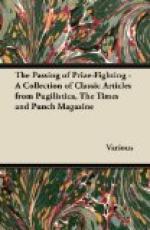As the seasons rolled by, however; as summer and winter ran their appointed courses and again the primrose pranked the lea unaccompanied by any signs of vernal activity on the part of the Paymaster-in-Chief, these visions of mine became less insistent. I was at length obliged to confess that another youthful illusion was fading; prize-money began to take its place in my mind along with the sea-serpent and similar figures of marine mythology. I was frankly hurt; I ceased even to raise my hat when passing the Admiralty Offices on the top of a bus.
That was a month or two ago; everything is all right again now. I once more experience the old pleasing thrill of emotion when riding down Whitehall. I have come to see how ungracious my recent attitude was.
A chance meeting with Bunbury, late sub-Loot R.N.V.R. and a sometime shipmate of mine—Bunbury and I had squandered our valour recklessly together aboard the Tyne drifters in the great days when Bellona wore bell-bottoms—sufficed to bring me head-to-wind.
In the course of conversation I referred to the non-fulfilment of our early dreams; I spoke rather bitterly.
“And there are fourteen millions somewhere belonging to us,” I concluded mutinously.
Bunbury regarded me with pained surprise. “Really, old sea-dog,” he said, “this won’t do. Never let the engine-oil of discontent leak into the rum-cask of loyal memories, you know. Now listen to me. Two years ago you and I wore the wavy gold braid of a valiant life; we surged along irresistibly in the wake of Nelson; we kept the watch assigned. Does not your bosom very nearly burst with pride to call those days to mind? It does. What then? Has it never once occurred to you that the last remaining link between us and the stirring past is this very prize-money you are so eager to soil with the grimy clutch of avarice? Don’t you realize that this alone exists to keep our memory green in the minds of our old leaders at Whitehall? Picture the scene as it is. Someone mentions the word ‘prize-money.’ Immediately the Lords of the Admiralty reach for their record files and begin turning over the pages. They come upon the names of John Augustus Plimsoll— yourself—and Horatio Bunbury—me. ‘Ah,’ they exclaim fondly, ’two of our old gunroom veterans—when shall we look upon their like again?’ Then they get up and go out to lunch.
“A month or so later the same thing occurs; once more our names leap out from the type-written page. ‘Brave boys,’ they murmur, ’gallant lads! What should we have done without them in the dark days? They shall have their prize-money this very—why, bless my soul, if it isn’t one o’clock!’
“Surely,” pursued Bunbury earnestly, “you appreciate the fine sentimental value of this one last tie? As long as our prize-money is in the keeping of the Service we can still think of it with intimate regard; we can still call ourselves BEATTY’S boys and hide our blushes when the people sing ‘Rule, Britannia.’ You must see that this is the only large-hearted way of looking at the matter.”




